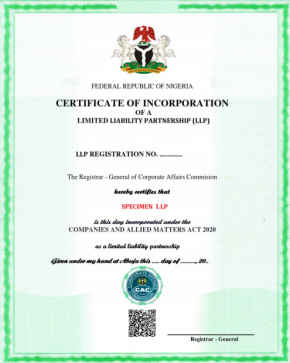Our Standard package provides essential formation documents, while the Pro package includes advanced features and ongoing support.
Public Limited Company (PLC) Incorporation in Nigeria
₦80,000.00
Register Your Nigerian Public Company Limited by Shares
PLC Incorporation Packages
Our Process
Choose a Package: Select your desired package and complete the secure online payment.
Provide Information: Submit your company details through our quick online form.
Process Your Application: We handle the filing and processing with the CAC.
Receive Documents: Get your CAC-approved business registration documents.
Why Choose us?
Fast & Efficient: Complete your registration in minutes with our streamlined digital platform.
Expert Support: Work with CAC-accredited agents and Chartered Secretaries for a seamless process.
Transparent Pricing: Enjoy clear, upfront pricing with no hidden fees.
Secure & Reliable: Trust us to protect your private information.
Requirements for Public Limited Company (PLC) Registration
Here are the requirements for Incorporating a Public Company Limited by Shares with the CAC:
Two (2) proposed company names in order of preference (1st choice and an alternative).
Business Objectives: Classification and Description of the Company's Principal Business Activity.
Directors: PLC must have at least 2 Directors. Provide Personal details - Full name, Address, Date of birth, Nationality, Means of identification, Occupation, and signature.
Members: PLC must have at least 2 initial Members / Shareholders. Provide Personal details - Full name, Address, Date of birth, Nationality, Means of identification, Occupation, and signature.
Secretary: PLC must appoint a qualified company secretary. Provide Personal details - Full name, Address, Date of birth, Nationality, Means of identification, Occupation, and signature.
Persons with Significant Control (PSC): Details of any individuals or entities that hold more than 25% of the company’s shares or voting rights, or otherwise exert significant influence over the company.
Witness: Witnesses sign incorporation documents to validate the signatures of directors and shareholders. Provide Personal details - Full name, Address, Date of birth, Nationality, Means of identification, Occupation, and signature.
Share Capital: Minimum authorized share capital of ₦2,000,000, with at least 25% issued and paid up.
Statement of Issued Share Capital: Breakdown of issued share capital, including the nominal value and number of shares.
Registered Address, phone number, postal address, and email of the company.
MEMART (Memorandum and Articles of Association): Document outlining the company's objectives, rules, management structure, and the rights of directors and shareholders.

Features of a Public Limited Company (PLC)
Here are the key features of a Public Company Limited by Shares:
Public Offer of Shares: A PLC can offer its shares to the general public, either through a stock exchange or other public invitations, allowing for broader public ownership.
Separate Legal Entity: A PLC has a separate legal identity, meaning it can own assets, sue, and be sued independently of its shareholders.
Limited Liability: The liability of shareholders is limited to the amount unpaid on their shares. Personal assets are protected beyond this limit.
Minimum Share Capital: A PLC in Nigeria must have a minimum authorized share capital of N2,000,000, with at least 25% of this capital subscribed and paid upon incorporation.
Shareholders: A PLC requires a minimum of two (2) shareholders but can have an unlimited number of shareholders.
Directors: A minimum of two (2) directors is mandatory for a PLC. However, there are other restrictions on the number of directors a company can have, depending on the type of company.
Company Secretary: It is mandatory for a PLC to appoint a qualified company secretary, responsible for ensuring compliance with legal and regulatory requirements.
Statutory Meeting Requirement: A PLC must hold a statutory meeting within six months of incorporation to inform shareholders of the company’s financial status and future plans.
Transparency and Disclosure: A PLC must disclose detailed financial and operational information to shareholders and regulatory bodies to maintain transparency.
Company Name: The company’s name must end with "Public Limited Company" or "PLC," as legally required, signaling its public nature and distinct status.

Benefits of Public Limited Company (PLC) Registration
Here are the key benefits of registering a Public Company Limited by Shares:
Public Listing and Market Access: A PLC can list its shares on a stock exchange, increasing visibility, liquidity, and access to a broader pool of investors for raising funds through shares, bonds, and debentures.
Limited Liability: Shareholders' liability is limited to the unpaid portion of their shares, protecting personal assets from business debts.
Enhanced Credibility: Registration as a PLC enhances trust and credibility with investors, partners, and customers due to the company's legal recognition and compliance.
Perpetual Succession: A PLC enjoys uninterrupted existence regardless of changes in ownership, management, or shareholders, ensuring business continuity over time.
Transferability of Shares: Shareholders can easily buy, sell, or transfer shares, making it easier to attract and retain investors.
Protection of Company Name: Registration protects the company name, preventing other entities from using it within Nigeria.

FAQs
Frequently asked questions about Public Limited Company (PLC) Formation in Nigeria:
A Public Limited Company (PLC) is a type of company that can offer its shares to the public and has limited liability for its shareholders.
In a PLC, the ownership is distributed among numerous shareholders, who can buy and sell shares freely, often through a stock exchange. This structure allows the company to raise significant capital by inviting public investment.
A PLC is characterized by its ability to operate as a separate legal entity, meaning it can own assets, enter contracts, and face legal actions independently of its shareholders. Additionally, PLCs are subject to strict regulatory requirements to ensure transparency and protect investors.
The main differences between a Private Limited Company (LTD) and a Public Limited Company (PLC) in Nigeria are:
- Ownership:
- LTD: Shares are privately held and cannot be offered to the public.
- PLC: Shares can be offered to the public and traded on a stock exchange.
- Shareholders:
- LTD: Requires a minimum of 2 shareholders, with a maximum of 50.
- PLC: Requires at least 2 shareholders, but can have an unlimited number.
- Capital Requirements:
- LTD: Must have a minimum authorized share capital of N100,000 naira.
- PLC: Must have a minimum authorized share capital of N2,000,000 naira.
- Regulatory Requirements:
- LTD: Fewer regulatory obligations and disclosures.
- PLC: Subject to stricter regulatory oversight and must publish financial statements.
- Transferability of Shares:
- LTD: Shares are not easily transferable and require consent for transfer.
- PLC: Shares are freely transferable, enhancing liquidity for shareholders.
Incorporating a PLC in Nigeria typically takes around 1 to 3 weeks, depending on how promptly the necessary documents are prepared and filed with the Corporate Affairs Commission (CAC).
Requirements include:
- A minimum of ₦2,000,000 share capital, with 25% issued and paid up.
- At least two shareholders and three directors.
- A qualified company secretary.
- Registered business address and Memorandum and Articles of Association (MEMART).
Yes, a PLC can operate without listing on a stock exchange, but it must meet additional requirements if it decides to list in the future.
Blog
We've put together some articles that might interest you:
Register Public Company Limited by Shares (PLC) in Nigeria
Here's how SplashDict's team of CAC-accredited consultants can help:
Company Registration: Nigerian Public Company Limited by Shares (PLC) Registration with the CAC.
Documentation Preparation: Our experts handle all necessary registration documents including the Memorandum and Articles of Association (MEMART).
Business Name Search and Reservation: We conduct availability checks and reserve your preferred company name.
CAC Filing Fee Included: No hidden costs, everything is included in the package price.
First Board Meeting Minutes Provided: We provide the legally required meeting minutes for your first board meeting after incorporation.
Submission and Processing: We manage the submission process to ensure compliance with all CAC requirements for timely approval.
Tax Identification Number (TIN): Issued upon incorporation.
Incorporation Documents Delivery: Receive all company registration documents, including the Certificate of Incorporation, Approved MEMART, and CAC Status Report.
Company Secretarial Support: Ongoing support with statutory filings, company resolutions, and regulatory compliance.
Company Register with Initial Entries: A copy of the company register, complete with the first entries, delivered upon incorporation.
VAT & PAYE Registration: Assistance with Value Added Tax (VAT) and Pay As You Earn (PAYE) registration (available anytime after incorporation).
Free Business Bank Account: Option to open a business bank account to facilitate financial operations.






